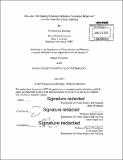How do CSR rating schemes influence corporate behavior? : lessons from the utility industry
Author(s)
Rutledge, Elisabeth Lea
DownloadFull printable version (3.285Mb)
Alternative title
How do corporate social responsibility rating schemes influence corporate behavior? : lessons from the utility industry
Other Contributors
Massachusetts Institute of Technology. Department of Urban Studies and Planning.
Advisor
Judith Layzer.
Terms of use
Metadata
Show full item recordAbstract
Ninety-three percent of the world's largest 250 companies report data to voluntary corporate social responsibility (CSR) rating schemes, and over 380 CSR rating schemes exist to assess companies' corporate actions. While reporting to CSR rating schemes may signal that a company takes responsibility for its environmental, social, and economic impacts, the correlation between responding to CSR rating schemes and taking meaningful action to minimize those impacts is still not entirely clear. This thesis asks, "Does responding to CSR rating schemes encourage corporate sustainability within organizations in the electric utility industry?" I sought to answer this question by conducting in-depth interviews with representatives of six companies in the electric utility sector about their reporting approach to the two most widely used rating schemes, the Carbon Disclosure Project (CDP) and the Dow Jones Sustainability Index (DJSI). I focused on the electric utility industry to ensure comparability and because this sector is strongly positioned to signal corporate sustainability trends given its current technological transformation, traditional use of fossil fuels, and heavily regulated structure. Based on these interviews I conclude that CSR rating schemes have succeeded in encouraging companies to disclose corporate sustainability data through voluntary mechanisms, but due to the existence of some perverse incentive structures, reporting does not fully motivate increased participation and action on corporate sustainability. Positively, CSR rating schemes lead companies to gather and centralize internal data across business units. In addition, external recognition from high CSR scores drives pride in corporate sustainability efforts and draws the attention of executives. However, CSR reporting lacks value for those utilities without end-use customers, does not provide commensurate value for the time required to participate, drives companies to focus primarily on reporting rather than on making substantive changes, and leads to mistrust in the CSR rankings because of the difficulty in understanding scores. Based on these findings, I recommend restructuring CSR rating schemes to provide multiple, issue-based scores to each company; replacing cross-sector assessment with sector-specific assessment; and revising the current assessment approach to include in-depth, on-site valuations of corporate efforts.
Description
Thesis: S.M., Massachusetts Institute of Technology, Department of Urban Studies and Planning, 2015. Cataloged from PDF version of thesis. Includes bibliographical references (pages 42-43).
Date issued
2015Department
Massachusetts Institute of Technology. Department of Urban Studies and PlanningPublisher
Massachusetts Institute of Technology
Keywords
Urban Studies and Planning.